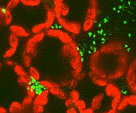Plant Pathology, Department of

Department of Plant Pathology: Faculty Publications
Document Type
Article
Date of this Version
2003
Citation
MPMI Vol. 16, No. 10, 2003, pp. 859–866. Publication no. M-2003-0801-01O.
Abstract
Plant pathology has made significant progress over the years, a process that involved overcoming a variety of conceptual and technological hurdles. Descriptive mycology and the advent of chemical plant-disease management have been followed by biochemical and physiological studies of fungi and their hosts. The later establishment of biochemical genetics along with the introduction of DNA-mediated transformation have set the stage for dissection of gene function and advances in our understanding of fungal cell biology and plant–fungus interactions. Currently, with the advent of high-throughput technologies, we have the capacity to acquire vast data sets that have direct relevance to the numerous subdisciplines within fungal biology and pathology. These data provide unique opportunities for basic research and for engineering solutions to important agricultural problems. However, we also are faced with the challenge of data organization and mining to analyze the relationships between fungal and plant genomes and to elucidate the physiological function of pertinent DNA sequences. We present our perspective of fungal biology and agriculture, including administrative and political challenges to plant protection research.


Comments
U. S. government work.